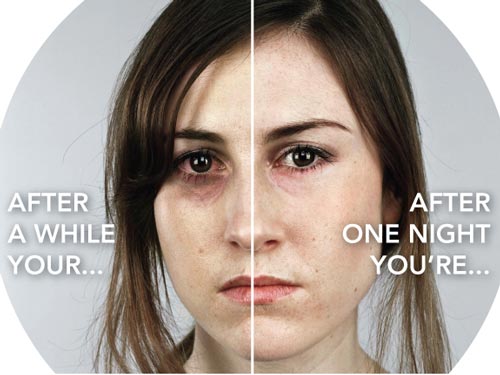There’s being tired and then there’s sleep deprivation. One poor night’s sleep might result in a lot of yawning and lack of energy, but this is easily overridden by some exercise and plenty of water.
In fact, poor sleep over two nights is fairly easy to get past, but after three nights of little sleep, symptoms of sleep deprivation will begin to set in. Should the poor sleep cycle persist for four or five days, chronic sleep deprivation will produce negative physical and mental states.

1. Eye Twitching
Twitching (flickering) of the eyelids is a classic sign of sleep deprivation. This is simply due to your eyes being open for too long without proper sleep, and a sign that the eyes are straining to work due to lack of sleep. This may be accompanied by the compulsion to excessively rub the eyes. Vision may also become periodically blurred.
2. Micro Sleeps
Micro sleeps occur without warning and are potentially very dangerous, particularly when driving or operating machinery. These mini-sleeps can last for milliseconds or a few seconds, and are the cause of many lorry-driving accidents.
When you are sleep deprived, yet force the body to stay awake by drinking coffee or keeping active, the moment you settle into a concentrated state, a micro sleep is likely to occur.
You’ve probably experienced one before without realising it because the eyes don’t necessarily close. Micro sleeping is a quick phasing in and out of consciousness, as if someone has quickly turned the lights off and on.
3. Fidgeting/Hyperactivity
When you’re tired you will feel compelled to sit down and rest at every opportunity. However, chronic sleep deprivation causes the reverse effect, producing excessive fidgeting and often hyperactivity.
You’ll find yourself unable to settle and relax, and even when driving or sitting down at a computer at work you’ll feel disturbed and on edge. This uneasy feeling is best cured through meditation or massage, which are both positive holistic pathways to better sleep.
4. Dizziness & Sickness
Chronic sleep deprivation is likely to result in dizzy spells, particularly when you stand up quickly or engage in exercise. You may also experience periodic nausea, although this is usually quite a different feeling to general sickness, and you aren’t likely to actually be sick.
5. Sporadic Hunger
A classic sleep deprivation symptom is sporadic hunger. You may find yourself eating lots more than usual, both at mealtimes and through the fulfilling of excessive cravings in between meals, and then at times not feeling hungry at mealtimes but becoming very hungry late or during at night.
Sporadic hunger is your eating clock malfunctioning due to lack of sleep. Your body is confused and doesn’t know when it should be eating, and as such the hormones responsible for triggering hunger are being released at random times.
But there’s an additional factor at play here. When the body is starved of sleep it moves to a higher survival mode level. The brain signals to the body that it should fuel up to compensate for the amount of extra energy being used due to lack of rest.
That said, although you may suddenly feel more hungry than usual at unusual times, you may also go through prolonged periods of not feeling hungry, and of feeling sick at the thought of foods you generally like.
In short, sleep deprivation interferes with your eating habits and disrupts your normal meal routine.
Read more about how good sleep hygiene can help you eliminate sleep deprivation.




